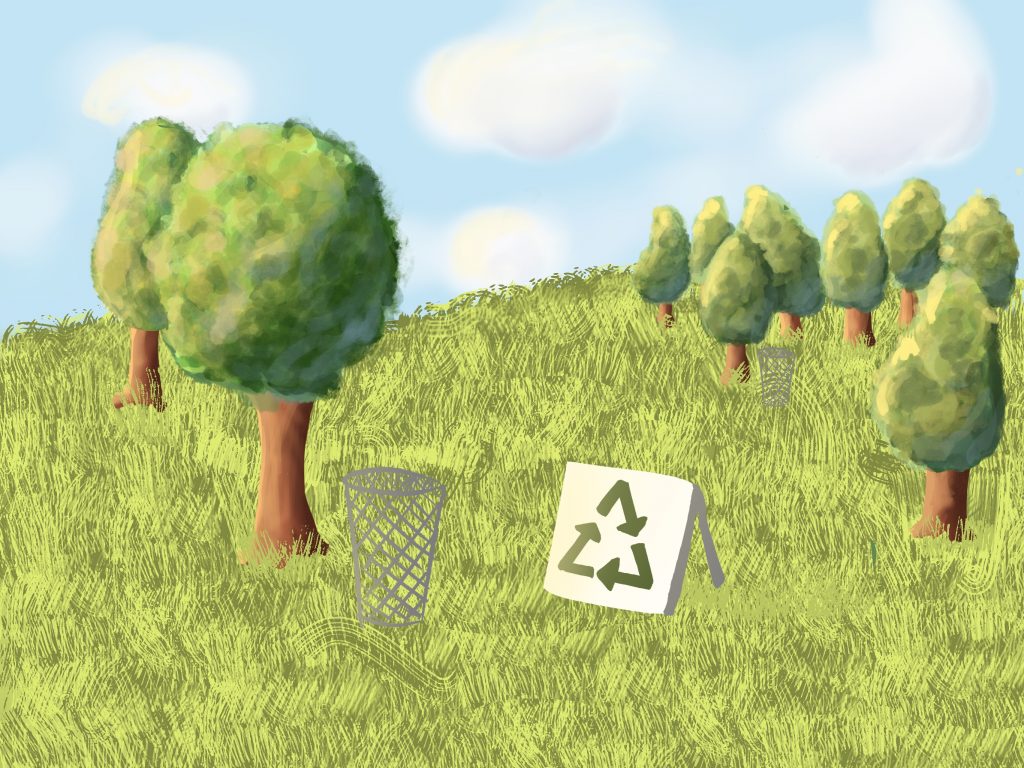On March 12, 2021, the Ridgewood Youth Environmental Council held its first online meeting of the year with students from the Ridgewood Public School district. The environmental council is perfect for students who are interested in growing food, hiking, and learning about nature. Students who are passionate about creating a sustainable future for our planet and seek to get involved in local environmental causes are a terrific match for the Youth Environmental Council.
Composting and possible methods to convince society to practice a green life were some of the main topics discussed during the online meeting. Compost is a mixture of decomposing and disintegrating organic materials into simpler organic and inorganic compounds, the product of the process of composting. Composts aren’t only rich in essential minerals and vitamins for plants, but they are also rich in beneficial microorganisms which allow the compost to act as a soil conditioner. When mixed with soil, compost improves the soil structure which increases the soil-water retention ability and thus controls soil erosion. Compost may be used for land and stream reclamation, eco-friendly landfill cover, and wetland construction. It introduces beneficial colonies of microbes in the soil, and thus increases soil fertility. Food scraps and yard waste, the ingredients of compost, take over more than 30% of the capacity of landfills, where they not only pointlessly and excessively occupy space but also release methane, a potent greenhouse gas that actively contributes to global warming. Hereby, composting those materials is very advantageous because it impedes the excessive emission of methane to the atmosphere, clears up space, and makes something useful out of waste which would otherwise be simple trash. Composting has a very significant impact on your wallet if your daily tasks or jobs entail engagement with plants, such as being a gardener. Making your own compost will allow you to save money on soil conditioner or fertilizer because your compost will do the trick. Moreover, you wouldn’t have to worry about intoxicating your soil with artificial compost because you know every single material used in your own one.
Although no research has been done regarding the effects of composting on mental health, I personally think that home composting is satisfying and relaxing. In my mind, taking all those goods from nature and giving them back to the earth eases my conscience. George Orwell writes in his book, Animal Farm, “Man is the only creature that consumes without producing.” Composting is proof that humans can consume while producing too, like any other form of life on Earth. Therefore, I regard composting as a way to thank nature for providing us with life and a way to rebel against Orwell’s accusations.
Composting requires the mixing of “Browns” and “Greens”. Browns are woody materials rich in carbon-like stalks, such as paper and wood chips, whereas greens are materials rich in nitrogen, such as leaves, grass, and food scraps. After acquiring all those materials, which shouldn’t be much of a hassle, and then accumulating them in a bin, composters then wet that dissolving mixture to catalyze the materials’ decomposition into humus, the decomposition of leaves and other plant material. The conversion of this mixture into humus requires at least 2 months. This process of composting is aided by the regular sprinkle of water, shredding the plant matter, and aerating it by regularly inverting the mixture. Exposure to sunlight shortens the duration of this process and earthworms, fungi, and bacteria further break up the organic material.
Although composting has many benefits on your wallet, nature and presumably, on your sanity, some are hesitant to commence composting. Some people complain that they are too busy to add an extra task to their schedule. A junior at Ridgewood High School who is passionate about composting, Zoe Kovac, texted her parents asking them how they regard composting. She wrote in her text message “We need to start composting, our waste is contributing to climate change and thereby we won’t be able to plant food in the ground anymore.” Her dad told her that composting was “a no” for him and her mom texted her back with “OMG! I really do not want to compost. Honestly, I don’t know that much about it but it just doesn’t feel like something I really want to get involved in.” There is some concern and discouragement towards composting as you can see. “Most commonly, people don’t want to start composting because it’s one extra thing to do. Of course, I understand that people would rather just toss their waste into their garbage bin, however, this is basically what you do when composting anyways. You can throw your compostable waste into a separate container that suppresses odor and once that container is full, you can bring it outside to your compost barrel” says Zoe, responding to her reluctant parents. Zoe articulates that “One of the reasons why some people might be feeling unsure about composting, and this I can attest to, is that people assume that composting is inevitably odorous and thereby will cause their property to stink. However, there are many measures which one can take in order to reduce the odor wafting from the compost bin, such as adding more “browns” to the compost.” Zoe, who has done an outstanding performance refuting all of those excuses, adds that “It is important to remember how beneficial composting is to the environment so I encourage everyone to consider the benefits and give it a shot!”
The Youth Environmental Council will arrange an Earth Day on April 24th from 11:30 to 1:30 pm at Habernickel Family Park in Ridgewood. On this eventful day, many environmental topics will be discussed and taught, and the group has even organized some games to play. If you’re seeking to learn more about composting and caring for the environment, then make sure to mark your calendars!
Elijah Otaner
Staff Writer
Graphic: Vivian Yuan

